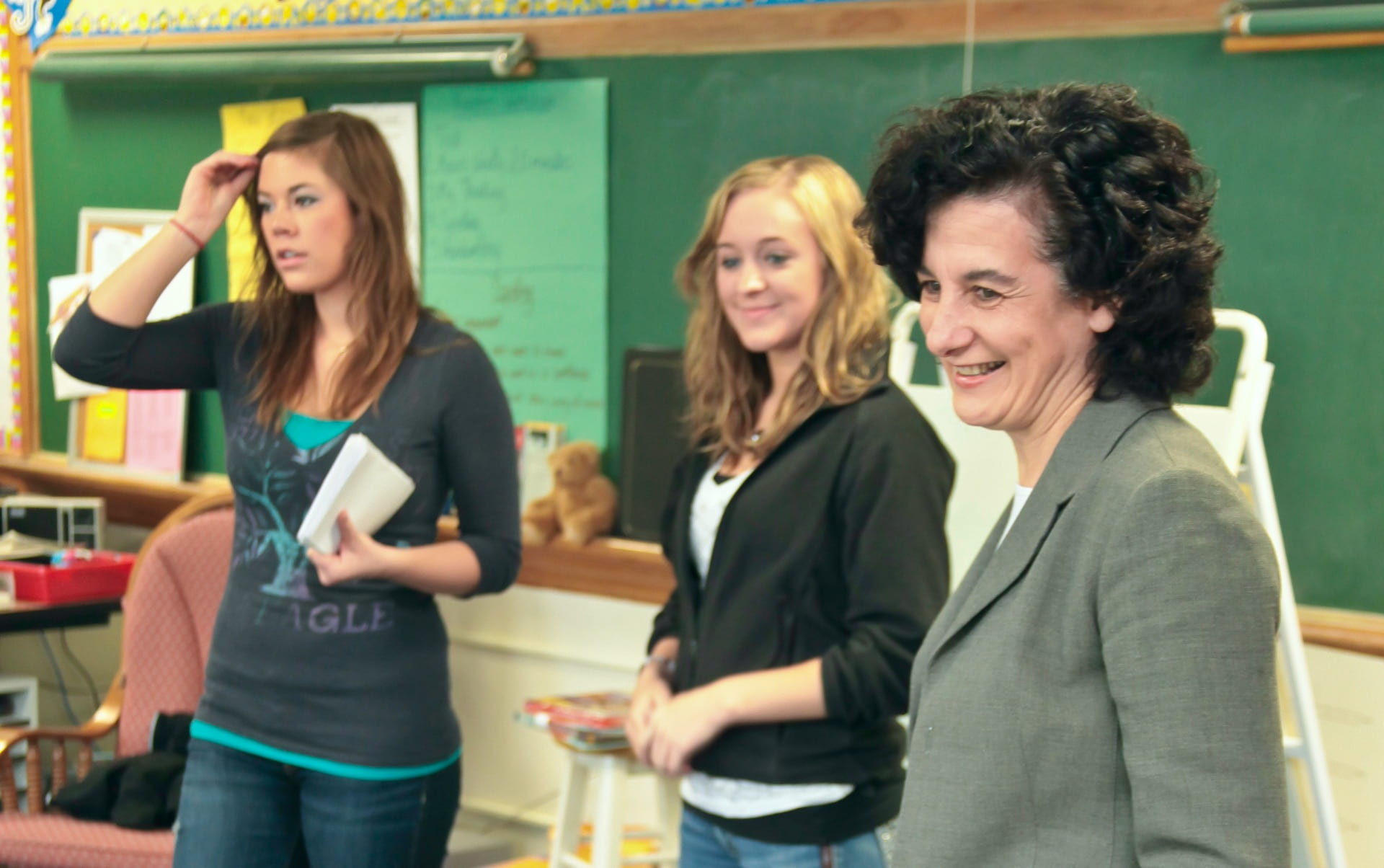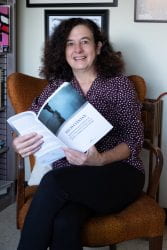Professor Cristina Ortiz: From sneaking banned books during the Spanish dictatorship to chair of Humanities

Born in San Sebastian, Spain, a northern coastal town in the Basque Country, UW-Green Bay Professor of Humanities and Global Studies Cristina Ortiz grew up during the last 12 years of the oppressive Franco dictatorship.
During the dictatorship, she learned about the importance of the humanities and artistic expression: “Because of the censorship during the dictatorship in Spain, certain books were banned, deemed ‘dangerous’ for their content, so if my mom wanted to read one of the censored books, she would send me—as a kid—to a friend’s house, and this person would wrap the book in newspapers to conceal the book, and I carried it home, pretending that I was carrying only a newspaper so as not to be caught by a policeman,” said Ortiz. “This situation made me tremendously curious about books. Why were they forbidden? Why was a dictator so afraid of words? The situation instilled in me the curiosity and desire to read and find out what was so ‘dangerous’ about books.”

Cristina Ortiz
In 1975 Franco died, and there was a sense—an increasingly contagious one—of hope and freedom. Ortiz was 12. And the renewal in the arts that ensued began to shape her curious mind. There was “music and pop bands, and rock. You know, everyone had something to say. And finally it was freedom to express those things.”
For Ortiz, it was a time to seek answers. Answers to what was happening in Spain, answers she sought in history books and literature. And having more questions than answers, Ortiz naturally gravitated toward the study of philosophy during her undergraduate years.
But her passion was in literature. So when somebody told her, “‘You know, in the United States, you can receive a stipend, and then you can take classes in literature,’” she responded: “They will pay you to read? What do I need to do!”
And so, after obtaining her undergraduate degree, Ortiz, with aspirations of teaching, left Spain in 1987 to pursue graduate studies in the United States at the University of Cincinnati. There, she was able to indulge her passion for literature: “The library was unbelievable for me as a Spaniard. And the fact that you could grab the books. You know, you didn’t have to ask somebody to go fetch the book that you wanted. . . . And I’m thinking, ‘Wow! I am in Disney World,’” said Ortiz.
In that library, she continued to cultivate her love for critical reading, artistic expression and philosophical questioning, all of which in 1993 set the pedagogical foundation for her career as a professor at the University of Wisconsin-Green Bay.
Ortiz didn’t choose Green Bay for its notoriously cold and snowy winters, though. “There was something about Green Bay, and especially what I really liked was the university and the people that I met during my campus visit when I came—and the students,” she said. “There was something about this place that I said, ‘Yeah, this is the place. I see myself here.’“
However, when Ortiz first arrived in Green Bay, she started to see herself as an outsider. “There were not Spanish speakers,” she said. “That self-awareness of not being able to be who you are, because the cultural differences and linguistic limitations were stark during those initial years. The limitations language puts on you is very difficult.”
Throughout her 29 years of professorship at UW-Green Bay, she has witnessed the city becoming more diverse. “Today there is a very significant Spanish-speaking community, and Hmong, Somali, and Afghan refugees,” said Ortiz. “The world has caught up with Green Bay, and Green Bay is catching up with the world, too.”
Despite this progress, however, Ortiz maintains a growth mindset and uses her early experiences in the city to help other minority groups and people of color create a more accepting and loving community. “I’ve seen Green Bay moving leaps forward. But there are still things to do. As we become much more diverse, there are much more things that need to be done.”
Ortiz continued: “When I first came here, I experienced a type of community that was perhaps a little more closed to people who were not born or raised or have their roots in this particular community. So, because having experienced that, I do everything I can to facilitate that the community becomes a place that respects, accepts people from a variety of backgrounds.” Professor Ortiz received the Outstanding Women of Color in Education Award twice for her contributions to advancing equity and inclusion for people of color within the University of Wisconsin system.
Ortiz encourages her students to express their ideas, and recognizes the importance of diversity of thought in her classes. Especially since she spent her early years in a social context in which books were banned, universities and professors threatened, and journalists killed; in a social context in which she contended with questions like, “Why is it that dictators, the first things they want to control are books, ideas, universities?”
She challenges her students to think critically and to always cultivate their curiosity, and encourages her students to become leaders in their communities. “I tell my students, ‘Use your time at the university to listen to the part of you that wants to write and read and think and question,'” said Ortiz. “‘Never forget that side of you who’s trying to express something unique, different.’”
Professor Ortiz enjoys playing her part in the University’s mission to create future leaders: “I’m very, very happy, when I’m serving in committees, when I’m working with the city, to be sitting side by side with somebody who a few years ago was a student in one of my classes and now is a community leader,” she said. “Nothing is more rewarding. I can’t think of anything better for a professor. That’s excellent. That’s the role of the university. The university has played, is playing, and needs to play the role of serving to form future leaders.”
“I love my job, the students,” she says.
Story by May 2022 graduating senior, Jonah Rogers (Humanistic Studies)
Photos: Marketing and University Communication



